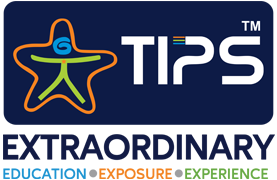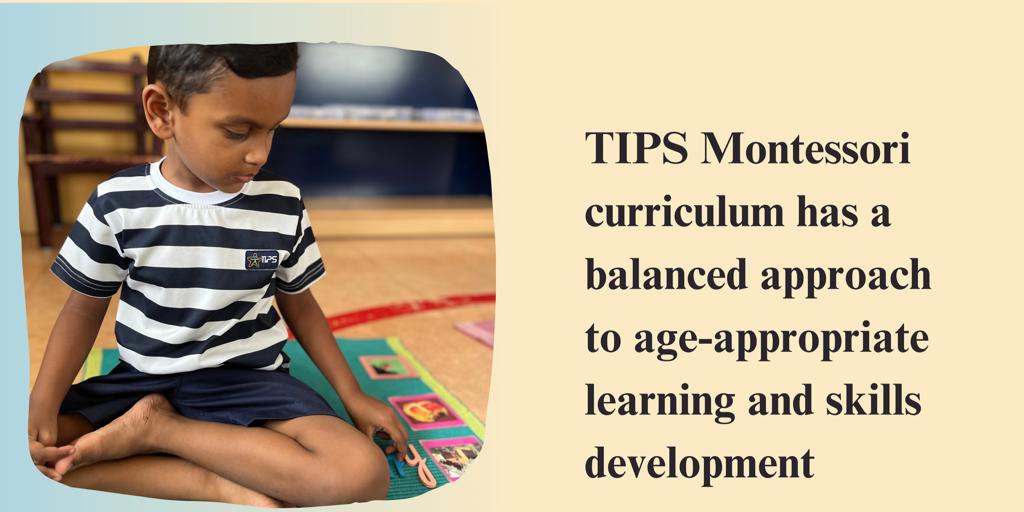- Blog By
Sumita Sen Mazumdar
Principal – Erode KG Campus
The Indian Public School – Erode.
October, 20 2023 | In Blog 
TIPS KG offers kindergarten curriculum for Playgroup to KG 2, for children between 1.5 years to 6 years of age. Here, in this blog, we will explore our TIPS Montessori programme available from Pre-KG to KG 2. Montessori as a curriculum originated in 1907 in Italy. Today, all over the world, including USA, India, UK, and Europe, it is very popular as a pre-primary programme because it focuses on bringing forth an independent, resilient child with very strong foundational skills. Most modern kindergarten programmes have liberally taken from Montessori processes and applications. The version of Montessori that we do today at TIPS KG is a contemporary, modern, globally aligned one that is compatible with most primary programmes, both within India and abroad. We have blended in best practices of Playway and Waldorf as well into our Montessori programme. After completing Montessori KG 2, at TIPS the parent can easily choose between CBSE grade 1 or IB grade 1 as options for the primary years. In terms of expected foundational milestones, Montessori being the broadest in scope, the child would be ready for grade 1 of either curriculum.
AREAS OF LEARNING
EXERCISES OF PRACTICAL LIFE
For an early years child, this would mean things like being able to take care of their own daily needs, eating independently, getting dressed on their own, responding appropriately when spoken to, taking care of pets or plants, tidying up after themselves, etc. When children do these activities, they become increasingly independent, self-reliant and confident, becoming prepared for more advanced learning. They will also refine their gross and fine motor skills, both of which need strong development in the early years. Gross motor movements would be the larger body movements that will develop core strength, balance, coordination, posture and gait. Fine motor movements are those of the hand, wrists, fingers, feet, toes and even the eyes and the tongue. We also have a fireless cooking studio where the children learn basic practical life skills of cooking and develop healthy eating practices too.
SENSORIAL ACTIVITIES
Sensorial learning in kindergarten is for the children to develop their skills of observation and refine the senses by categorizing the world around us through all five of the senses using the appropriate contextual vocabulary. So, the children will learn to differentiate colours, sizes, shapes, sounds, tastes, textures and so on.
LANGUAGE LEARNING IN KG
We will do English, Tamil and Hindi from Pre-KG to KG 2. We follow the LSRW progression and phonics method. Listening, Speaking, Reading and Writing (LSRW) is how language development progresses. The first two, listening and speaking skills are part of language absorption that typically happens during Playgroup and Pre-KG. Mostly, because in all of our life, the most sensitive that we are to language absorption is between the ages of 0 to 3 years. Between 12 months to 3+ years, without knowing any grammar, provided there was sufficient exposure to a language, the child is capable of replicating it perfectly. This is nature’s mechanism of language development in the early years. If a child does not have this phase of language absorption, with no listening and speaking skills for the particular language in place, and is sent to learn the alphabet sounds and to read directly, language fluency can never be achieved, no matter how old the student grows. In a country like ours, where English is not typically spoken in the home environment because it is not our mother tongue, the early kindergarten environment becomes even more important for the language absorption phase of English; in school to learn anything else in primary or secondary, it is essential to know English. The school kindergarten environment is especially prepared so that the child receives the necessary language inputs in a natural manner, not an artificial rote learning one, because for listening and speaking skills to develop it has to be a natural absorption with visual and other sensorial cues side by side with language, just like how the mother tongue is absorbed.
English in KG – At the end of Playgroup, the child moves from using gestures to words, naming or action words, expressing needs or feelings. At the end of Pre-KG, the child can express themselves in English in a complete sentence formation or what we call the SVO pattern (subject-verb-object). At the end of KG 1, the child can read short sentences in English and write 3-letter words. They will know a reasonable list of sight words (to be read on sight and not phonetically spelt) as well. At the end of KG 2, the child can read in continuity, a paragraph in English. They will expand their list of sight word recognition. They can write 3 to 4 sentences into a coherent paragraph, framing their own sentence constructions.

WHEN DO THE CHILDREN TAKE UP WRITING?
In KG 1, side by side with blending alphabet sounds and reading, the children will take up pre-writing, where they will work with a pencil and do other activities too, such as tracing the alphabets and numbers on different materials so that a muscular memory impression is created and the hand learns how to move. When we observe that the pre-writing strokes and curves are steady, it is a sign that the child is ready for writing the alphabets and numbers. Forcing the child before their musculoskeletal system is ready or when pre-writing is still shaky causes more harm than benefit because the children would have to contort or bend their fingers to achieve the greater pencil control needed to write alphabets or numbers. The children would be individually assessed, and mostly, they will take up writing of the alphabets and the numbers either in the middle of KG 1 or towards the end of KG 1 depending on individual readiness of the child.
Tamil & Hindi in KG – In Pre-KG, the child will learn through songs and rhymes. They will know colours, numbers, action and naming words. In KG 1, they will add to vocabulary through storytelling and conversational language development. In KG 2, they will learn the vowels and consonants. The children will take up writing of the vowels and some consonants, first for Hindi and then Tamil in KG 2.
MATH
The children will do pre-math concepts such as sorting and matching in Playgroup. In Pre-KG, the child will become familiar with the numbers through songs and finger rhymes. In KG 1, they will learn, in the concrete-to-abstract method, and working with physical materials, the concept of quantities and how these are different for each of the number names. They will go up to 20 in KG 1 and can write up to 10. In KG 2, they can read and write up to 100 along with a few basic math concepts such as greater or lesser than, odd or even, skip counting, combination or simple addition.

ENVIRONMENTAL SCIENCE (EVS)
When a child steps out of their home, there will be so many things they would see; the sky, ground, roads, buildings, vehicles, community helpers, festivals being celebrated, etc. This understanding of the broader world around us is what EVS is about. It is a hands-on exploration of elements of nature, environment, science, history, culture, etc., both within the classroom environment and outside it. The children have outbound learning engagements where they go on field trips to various places to establish a connection between classroom learning and real-world experiences.
PLAY & MOVEMENT
Through the myriad forms of play, children develop a variety of much-needed skills. Critical thinking, which is the ability to objectively analyze and evaluate before coming to a conclusion, problem solving on-the-go, social skills, patience, tolerance, gross motor skills, and very importantly, there are some prescribed movements which when given in the early years can achieve excellent integration between the right or the creative side of the brain and the left or the logical side of the brain. When such integration is achieved, the child can grasp new information better, there is excellent retention and recall, and they can establish a connection between different inputs in a far superior way. Therefore, physical engagements are important for the early years child. Movement is woven into the curriculum. PE and dance are very much part of our kindergarten timetable. The children also enjoy splash pool time on campus as part of their physical and sensorial exploration.
ARTS & CRAFTS
Arts and Crafts are a big part of early years learning. Imagination, mindfulness, sensorial learning, motor skills, vocabulary develop quickly and naturally through such activities as children cut, crumple, draw, colour, paint, or glue together their artwork or craftwork. We regularly do theme-based art and crafts to observe important calendar days so that the children can physically relate to the particular event. For example, on Gandhi Jayanthi Day, the children may create a spinning wheel out of popsicle sticks as a physical representation of symbolism that is associated with the occasion.
ANNUAL EVENTS
For KG, we have Sports Day, Annual Day, KG 2 Graduation Day, Buddy Day, Grandparents’ Day and Happiness Week at KG Campus. We have different kinds of events, some where the children showcase their talent, skills, learning acquired in a participative environment, and some where the children get the opportunity to bring in their friends, family and community into their learning environment.
CORE VALUES
Core values are what helps to differentiate between right and wrong, and what society expects of us. We believe there are some core values that are relevant to the kindergarten child in their present stage of development, and also for their future. Each value is worked on for a period of 1 or 2 months depending on what the core value is. There will be picture displays, discussions, role plays, and the adults on campus consciously enact the values so that children, who learn by observing and doing, will also practise these values. The Kindergarten Core Values are: Independence, Patience, Respect, Gratitude, Honesty, and Compassion.
LIFELONG CONFIDENT LEARNER
At TIPS, every child is nurtured to become a lifelong learner. Even in kindergarten, every child is encouraged that every day, be it through play or activity, every moment can be a learning moment, to develop a learner’s mindset or outlook. This is because in life, to thrive, we must be willing to adapt and in order to adapt, we must be willing to learn. So, it is important to remember to be a lifelong learner.
To sum it up, the Montessori KG campus programme is one where we are extremely focused on achieving necessary academic milestones, creativity, social skills, and overall holistic development. At the same time, there should be joyfulness for the child, they should get to enjoy their childhood, natural curiosity should be encouraged and not suppressed, and they should be happy at the thought of waking up in the morning and getting ready to come to school, excited at the prospect of learning and exploring. This to us, is a happy and successful kindergarten and what we offer.




